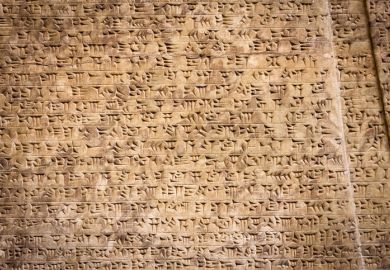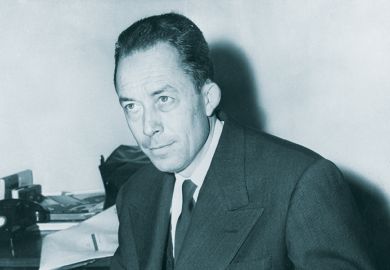Time was when we assumed that the call to studenthood would entail a monkish existence lived mainly in libraries.
Now we understand that students spend most of their time “working” - hence, perhaps, these all-inclusive learning packages.
This new series of sourcebooks actually involves resourcing - “locating” canonic and influential works through excerpted fragments of recent and older literary debate, literary and historical contextualisings, relevant literary and historical chronologies, and insistent (and occasionally excessive) editorial cladding in the form of scholarly summarisings and suggestions.
“Key passages” from the works in question placed at the end of the intellectual quest, suggest that the work itself may be that “last reward of consummate scholarship” Mark Pattison saw in the reading of Milton. Perhaps they might have been put at the beginning just to let the dog see something of the actual rabbit from the outset.
There is no doubt that humanities students at undergraduate level will find these compendia useful. But their world of dijecta membra may make things more difficult to assimilate than the original scholarly wholes from which they have been subtracted.
The selection of sourcebooks in itself is tailored to wide-ranging requirements, covering treatments of two canonical novels, two Shakespeare plays, a poetry collection, and a discursive text, and spanning the Renaissance, Romantic and modern periods.
Andrew Hadfield’s treatment of Othello easily convinces us of its relevance not merely to issues of race and gender but also to a more general sense of the shifty origins of our “sense of identity”. Citing the contemporary account of Othello ’s Venice in Thomas Coryat’s Crudities (used by Shakespeare), Hadfield seems to make Coryat’s title something of a buzzword. Othello succumbs to Iago’s crudities, already insecurely infected by those of others, including Desdemona’s father. At the same time Paul Robeson, the first black Othello, endures crudities in the 1930 London production of the play.
Grace Ioppolo’s sourcebook on Lear reminds us of the paradoxes of canonicity and the aesthetics of reception. The play shocked and alienated post-Restoration audiences and for 150 years they were happy to watch it in a “Lear-u-like” version in which Cordelia and Lear are “dismissed to happiness”. It was rescued from sentimentality, ironically, by the Romantics.
Peter Childs’ discussions of E. M. Forster’s finest (and final) novel A Passage to India reminds us of how much David Lean’s 1984 film is out of kilter with its original. While the film focused on the course of Adela Quested’s “desire(s)”, Forster invested heavily in Aziz’s burgeoning feelings about the bluff, unprejudiced Fielding and, finally, in the serene and beautiful courtroom “punkah-wallah” he specifically wished to be seen as supremely important to the work. Forster’s homosexuality “becomes” his radical perspective here and a collection of critical essays on Queer Forster - a significant recent critical intervention - might have been a useful addition to the bibliography.
Frankenstein might be described as an early example of “chick lit”, although it was a work to trouble traditional literary taxonomy. As this sourcebook shows, the work by Mary Shelley (daughter of early feminist vindicator Mary Wollstonecraft) was canonised from below. But its transposition into many a scary movie was not altogether a happy fate for a highly intellectual product that analysed its cultural dispensation with something of the mordant alienation of a Jonathan Swift, far from the world of Shelley’s snobbish contemporary Jane Austen.
Also Austen-troubling to a degree was the work of Wollstonecraft. Adriana Cracium’s sourcebook demonstrates how her Vindication of the Rights of Woman (1792) has come into sharper focus, refracted by various paradigms offered by modern feminist debate.
Finally, John Strachan offers a less controversial but nevertheless exemplary take on Keats. The book poses questions about the relative merits of early and late poems, questions imbricated with those relating to the degree and manner of his political engagement in poetry.
John Peck and Martin Coyle may be said to have written a History of English Literature at just the worst possible moment: all its buzzwords are “under erasure”. “History” is automatically “of the victors” and may offer Whig interpretations, grand narratives and similar discredited tales of progress or redemption; “literature” is merely an arbitrary collection of writings corralled into canonicity; while “English” is merely a misnomer for Anglophone writers of highly various racial extraction or affinity. As if orchestrating this idea, the story begins with an Anglo-Saxon poem utterly unintelligible to the vast majority of modern English people - Beowulf , recently translated by that thoroughly professional Irishman Seamus Heaney.
Tellingly, the short secondary reading list itself often seems theoretical rather than historical. This book has no trouble being chatty and engaging, and even if it contains much that might be disputed, the reader will profit from the exercise. And a work that offers to read all English literature for you (and also tell you what to think of it) should always get a charitable reception. It will probably do its best work at sixth-form and first-year undergraduate levels.
Edward Neill formerly taught literature at Middlesex University.
A Routledge Literary Sourcebook on Mary Wollstonecraft’s A Vindication of the Rights of Woman
Editor - Adriana Craciun
ISBN - 0 415 235 6 and 236 4
Publisher - Routledge
Price - £45.00 and £9.99/£10.99
Pages - 184
Register to continue
Why register?
- Registration is free and only takes a moment
- Once registered, you can read 3 articles a month
- Sign up for our newsletter
Subscribe
Or subscribe for unlimited access to:
- Unlimited access to news, views, insights & reviews
- Digital editions
- Digital access to THE’s university and college rankings analysis
Already registered or a current subscriber? Login



